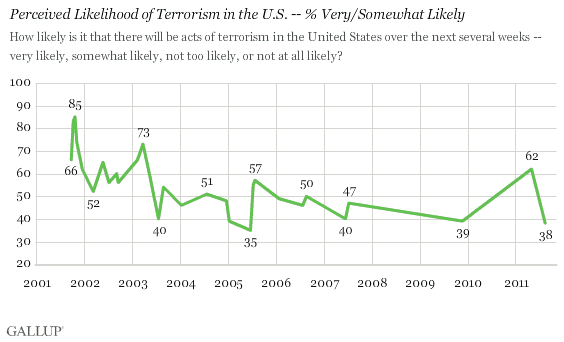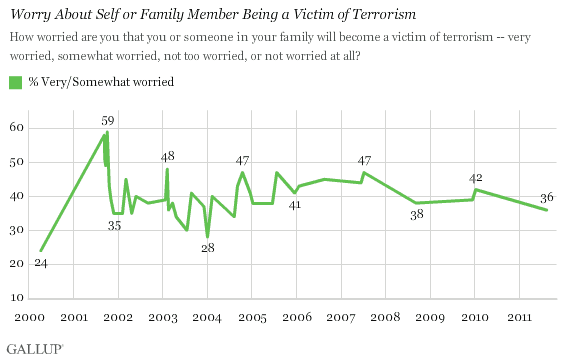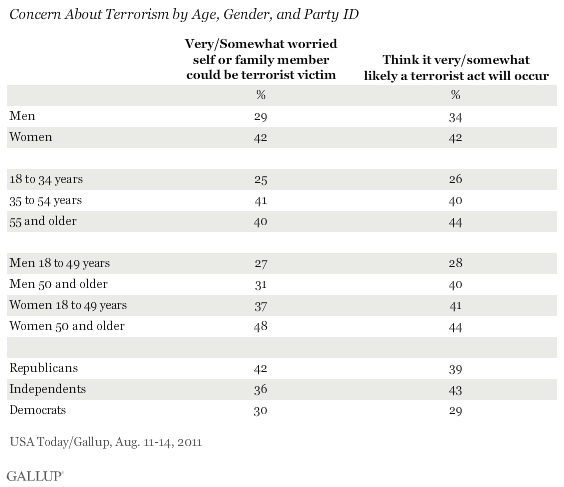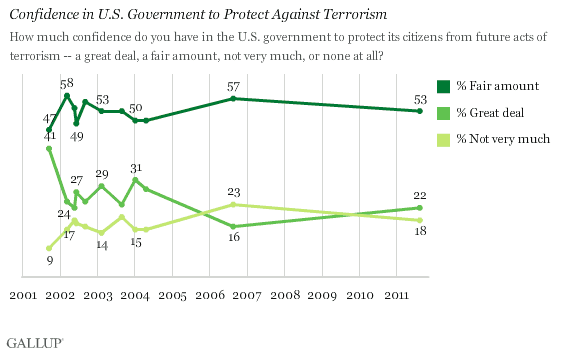PRINCETON, NJ -- Americans' fear that a terrorist attack in the U.S. could be imminent has retreated from the high level Gallup recorded shortly after al Qaeda leader Osama bin Laden was killed at his hiding place in Pakistan on May 1. It is now on the low end of the range seen over the past decade.

Thirty-eight percent of Americans currently believe terrorist acts are very or somewhat likely to occur in the coming weeks, down from 62% in Gallup's May 2 poll, but similar to the 39% recorded in November 2009.
The latest reading is from a USA Today/Gallup poll conducted Aug. 11-14, roughly a month prior to the 10th anniversary of 9/11, when nearly 3,000 were killed in hijacked plane attacks on the Pentagon and World Trade Center towers, as well as in a separate crash of a hijacked commercial jetliner in Pennsylvania.
The same poll finds 36% of Americans feeling very or somewhat worried that they or a family member could become a victim of terrorism. About a quarter of Americans held this concern in April 2000; it then registered highs of 58% and 59% in the first few weeks after 9/11, but has since varied between 28% and 48%.

Women, adults 35 and older, and Republicans are more likely to believe an attack could happen and are more worried about becoming a victim than are men, young adults, and Democrats.
These gender and age differences are slightly amplified when the two categories are combined. On this basis, women 50 and older are the most concerned about terrorism and men aged 18 to 49 are the least concerned.

Since 9/11, Americans have not shown an overwhelming amount of confidence in the U.S. government's ability to protect its citizens from future terrorist attacks. The percentage saying they have "a great deal of confidence" was highest immediately after 9/11 (41%), when Americans were more inclined to have positive views about the nation's leadership as a matter of patriotism; however, this fell to between 22% and 31% in the first few years after 9/11, and then dropped further, to 16%, in 2006 as Americans were becoming increasingly critical of the Iraq war. The 22% expressing high confidence today -- including 33% among Democrats, 19% among independents, and 15% among Republicans -- is just slightly better than that.
Still, a relatively small 18% say they do not have very much trust in the government to protect against terrorism, while 53% have a fair amount.

Bottom Line
Despite the approaching 10th anniversary of 9/11, Americans' belief that a terrorist attack could soon occur is on the low end of the range Gallup has seen over the past decade and their concern about terrorism victimizing their family is about average. Americans' confidence in the U.S. government to protect them from future acts of terrorism has recovered slightly from the low point recorded in 2006, but is not as great as it was in the first few years after 9/11.
Survey Methods
Results for this USA Today/Gallup poll are based on telephone interviews conducted Aug. 11-14, 2011, with a random sample of 1,008 adults, aged 18 and older, living in all 50 U.S. states and the District of Columbia.
For results based on the total sample of national adults, one can say with 95% confidence that the maximum margin of sampling error is ±4 percentage points.
Interviews are conducted with respondents on landline telephones and cellular phones, with interviews conducted in Spanish for respondents who are primarily Spanish-speaking. Each sample includes a minimum quota of 400 cell phone respondents and 600 landline respondents per 1,000 national adults, with additional minimum quotas among landline respondents by region. Landline telephone numbers are chosen at random among listed telephone numbers. Cell phone numbers are selected using random-digit-dial methods. Landline respondents are chosen at random within each household on the basis of which member had the most recent birthday.
Samples are weighted by gender, age, race, Hispanic ethnicity, education, region, adults in the household, and phone status (cell phone only/landline only/both, cell phone mostly, and having an unlisted landline number). Demographic weighting targets are based on the March 2010 Current Population Survey figures for the aged 18 and older non-institutionalized population living in U.S. telephone households. All reported margins of sampling error include the computed design effects for weighting and sample design.
In addition to sampling error, question wording and practical difficulties in conducting surveys can introduce error or bias into the findings of public opinion polls.
View methodology, full question results, and trend data.
For more details on Gallup's polling methodology, visit www.gallup.com.
